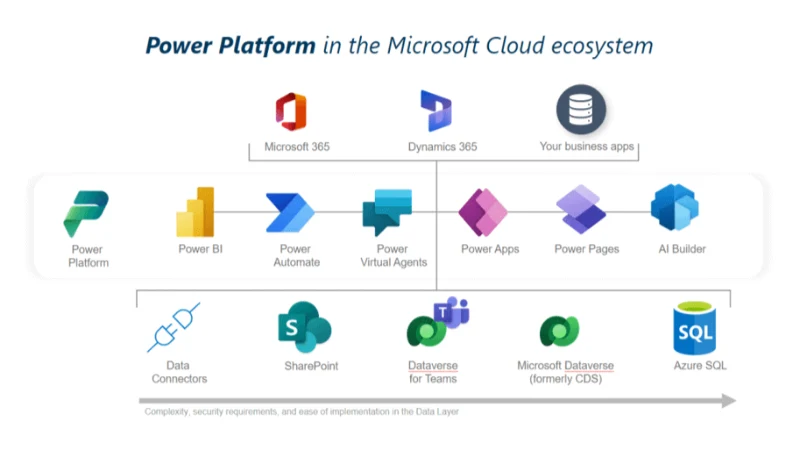In the rapidly transforming digital landscape of Saudi Arabia, government entities are under immense pressure to modernize operations, improve service delivery, and increase transparency—goals that align closely with the Kingdom’s ambitious Vision 2030. At the core of this transformation lies automation, and one of the most influential tools enabling this shift is the Microsoft Power Platform. Backed by the robust Microsoft Cloud Service in KSA, this suite of low-code/no-code tools is driving a wave of digital empowerment across ministries, municipalities, and public agencies.
Understanding Microsoft Power Platform
The Microsoft Power Platform includes four primary tools:
- Power Apps: Allows users to build custom applications quickly without deep coding knowledge.
- Power Automate: Enables workflow automation across multiple applications and services.
- Power BI: Provides advanced data analytics and visualization capabilities.
- Power Virtual Agents: Lets users create AI-driven chatbots to interact with citizens or internal stakeholders.
Together, these tools form a powerful ecosystem that connects to Microsoft 365, Azure, and hundreds of other data sources—making them an ideal solution for streamlining government workflows in a secure and scalable way.
Why Government Entities in KSA Need Workflow Automation
Government institutions in Saudi Arabia often face challenges such as:
- Manual paperwork and approval cycles
- Limited integration between systems
- High operational costs
- Delayed service delivery
- Citizen dissatisfaction due to long wait times
With automation, these pain points can be significantly reduced. The Power Platform provides a unified, centralized framework to eliminate redundant processes, automate approvals, and empower employees to focus on more strategic tasks.
Microsoft Cloud Service in KSA: A Foundation of Trust
Before diving deeper into Power Platform’s role, it’s important to highlight the significance of Microsoft Cloud Service in KSA. Microsoft has established local data centers in Saudi Arabia to address crucial concerns like data residency, regulatory compliance, and national cybersecurity. This local infrastructure supports the performance, security, and legal requirements essential for handling sensitive government data.
When Saudi ministries adopt Power Platform tools, they benefit from the robust backbone of the Microsoft Cloud—ensuring that all automated workflows and datasets remain secure, compliant, and accessible.
Real-World Applications of Microsoft Power Platform in KSA’s Public Sector
1. Streamlining Citizen Services with Power Apps
Government departments can use Power Apps to build mobile-friendly portals for services like permit applications, license renewals, or appointment scheduling. These apps can be deployed in weeks, not months, thanks to the platform’s drag-and-drop functionality.
For example, a municipality in Riyadh might create an internal app to automate the building permit process. Instead of manually reviewing physical documents, officials can receive digital submissions, verify them through automated workflows, and approve them via a mobile interface—all powered by Microsoft’s cloud infrastructure in the region.
2. Automated Document Routing with Power Automate
A major inefficiency in government offices is the manual movement of documents for approvals. Power Automate revolutionizes this by creating intelligent, rule-based flows.
Imagine a scenario where a procurement request in a ministry needs approval from five different departments. Instead of physical routing or email chains, Power Automate pushes the request automatically through each approver, logs timestamps, sends reminders, and updates dashboards—resulting in a faster and more transparent process.
3. Data-Driven Governance with Power BI
Saudi Arabia’s push toward data-driven decision-making aligns perfectly with Power BI. Ministries can gather data from citizen feedback, service logs, and workflow performance to identify bottlenecks or inefficiencies.
A dashboard showing average processing time for visa renewals, for instance, can help immigration officials identify peak periods, allocate resources more effectively, and improve turnaround times. By leveraging insights from Power BI, departments become more proactive rather than reactive.
4. 24/7 Citizen Interaction with Power Virtual Agents
One of the key goals of Vision 2030 is improving citizen engagement. Power Virtual Agents allow government entities to create AI-powered chatbots that can respond to queries on regulations, office hours, and documentation requirements—anytime, anywhere.
For example, the Ministry of Health could deploy a chatbot to guide users through COVID-19 testing procedures, vaccination centers, or travel advisories. These bots can integrate with backend systems, ensuring responses are personalized and up-to-date.
Integration with Legacy Systems and Data Sources
One of the major concerns in digital transformation is legacy system compatibility. The Microsoft Power Platform shines here too. It supports integration with over 800 connectors—from Oracle databases and SharePoint to custom APIs—allowing governments in KSA to build on existing infrastructure without starting from scratch.
By using Microsoft Cloud Service in KSA, these integrations are conducted securely within national boundaries, ensuring data sovereignty and minimizing the risk of cross-border data exposure.
Empowering Non-Technical Government Employees
Another transformative aspect of Power Platform is democratization of technology. Public sector employees—regardless of their technical background—can learn to build simple apps, automate tasks, and even create dashboards with minimal training. This is vital in scaling digital transformation across various departments.
Microsoft also provides localized training and support in KSA, enabling a skilled digital workforce ready to create impactful solutions using the Power Platform.
Compliance and Cybersecurity: Built into the Platform
With growing cyber threats, government agencies need a platform that offers strong security and compliance capabilities. Power Platform, backed by Microsoft Cloud Service in KSA, offers built-in DLP (Data Loss Prevention), multi-factor authentication, encrypted data transit, and comprehensive audit trails.
Moreover, local hosting ensures compliance with Saudi regulatory frameworks such as those defined by the National Cybersecurity Authority (NCA) and the Saudi Data and Artificial Intelligence Authority (SDAIA).
Measurable Benefits for Government Entities
By automating workflows using Microsoft Power Platform, KSA’s public sector can realize measurable benefits such as:
- 50–70% reductionin process cycle times
- 30–40% improvementin citizen satisfaction scores
- Significant cost savingsthrough reduced manual work and paper usage
- Higher transparency and accountabilityin service delivery
Looking Ahead: AI Integration and Next-Gen Services
As Saudi Arabia advances toward becoming a digital leader in the Middle East, Microsoft is continuously evolving the Power Platform. New features such as AI Builder and Copilot (an AI assistant integrated across Microsoft 365 apps) will make it even easier for KSA’s government entities to build intelligent, responsive solutions.
With Microsoft Cloud Service in KSA providing a secure and high-performance environment, the possibilities for innovation are limitless.
Final Thoughts
The Microsoft Power Platform is more than just a suite of productivity tools—it’s a catalyst for digital transformation in Saudi Arabia’s public sector. By enabling low-code development, seamless automation, powerful analytics, and intelligent bots, it empowers government institutions to meet the demands of modern governance.
Coupled with the localized and secure Microsoft Cloud Service in KSA, the platform ensures that innovation does not come at the cost of compliance or security. As Vision 2030 continues to push the Kingdom toward a knowledge-based economy, tools like the Power Platform will play an essential role in turning digital ambitions into everyday realities.


